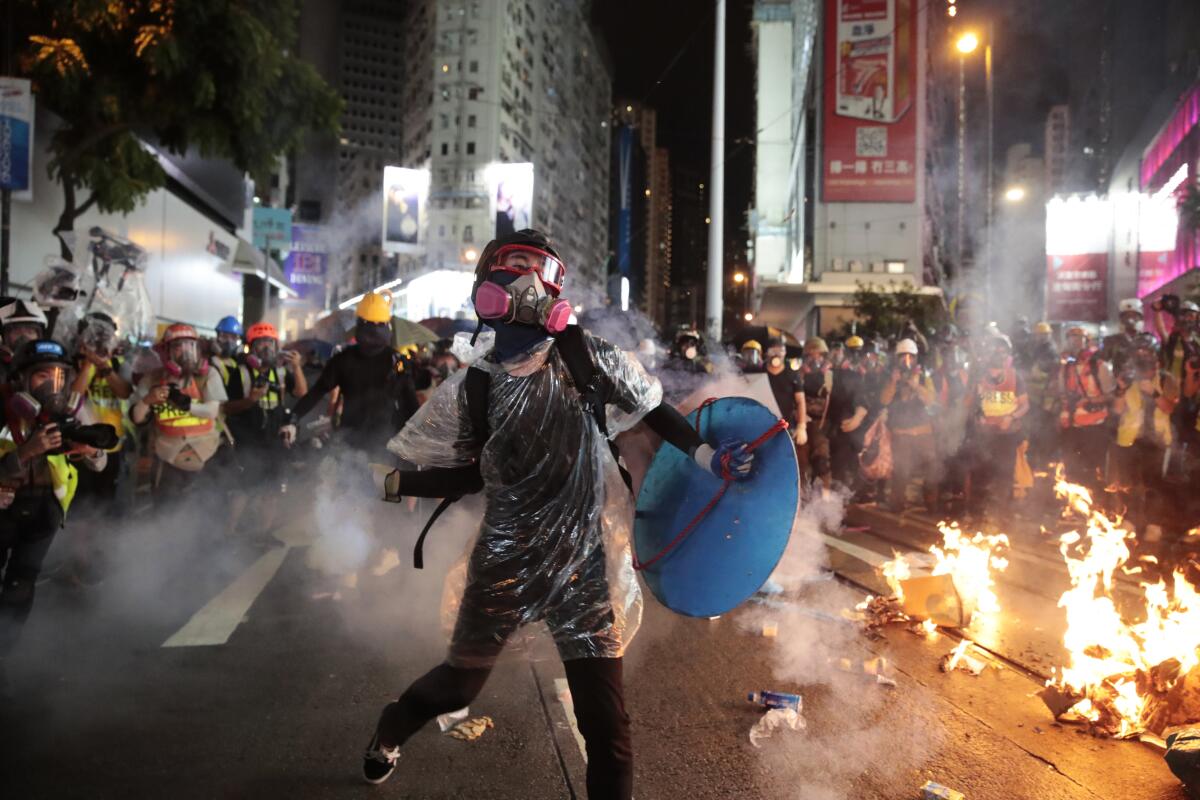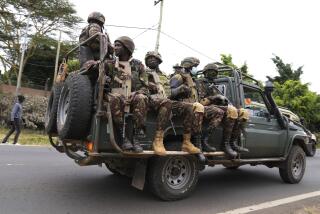New violence erupts in Hong Kong after protesters march in defiance of police ban

- Share via
HONG KONG — A day of peaceful protests in Hong Kong turned chaotic Saturday night as police and demonstrators faced off in violent battles that seemed to mark a grim turning point in a summer of unrest.
Protesters set fire to barricades and hurled bricks and gasoline bombs. Police fired water cannons and tear gas. Numerous arrests were made, some by undercover police dressed as protesters.
After police first fired tear gas around 5 p.m. near the Legislative Council building, Hong Kong’s parliament, battles erupted at police barricades on nearby Harcourt Road. Firefighters doused a blaze set by protesters at a road barricade close to police headquarters.
At one point, police stormed a subway station and began beating people and firing pepper spray into train cars.
The clashes, which broke out in locations across the city, were fueled by anger over the arrests Thursday and Friday of pro-democracy lawmakers and prominent student leaders, including Joshua Wong and Agnes Chow of the youth activist movement Demosisto.
Protesters said it was a crucial moment to show solidarity with the pro-democracy activists.
Defying a police ban, they marched and chanted, paralyzing afternoon traffic in a fashionable shopping neighborhood and descending on the Hong Kong central government office. Police responded with tear gas, rubber bullets and water cannons.
As darkness fell, many protesters dispersed, but others blocked roads, set fire to barricades and hurled bricks and gasoline bombs at police in one of the most intense battles seen yet.
The demonstrators moved swiftly from one location to another to evade police. Authorities shut down some subway stations to hamper the flow of protesters.
The government condemned the protesters for engaging in violence, damaging property and endangering the public.
The protest movement began this year as a revolt against an unpopular extradition law but morphed into a broad movement against police brutality and Beijing’s unwanted control over the Chinese territory.
Saturday’s demonstration began like many others in the last few months — with thousands of people marching through downtown streets. The initial crowd included many elderly people, children and people in wheelchairs.
They gathered in the early afternoon at Southorn Playground sports stadium in Wan Chai district for a prayer meeting, where they chanted a phrase meaning “Add oil!” to encourage action, and sang, “Hallelujah to the Lord.”
The impetus for the day’s march was the arrests, which were widely seen as an attempt to frighten people into staying away from such demonstrations.
“They arrested pro-democracy activists so we have to come out and speak out about our concerns,” Joycelyn Yuen, 50, said at the prayer meeting. “I was shocked by the arrests. It’s designed to scare people from coming out today, so we have come out to support the pro-democracy activists.”
Yuen said she was also protesting police violence against demonstrators. “We have to support these young people,” she said. “They have sacrificed so much for us. They’re getting arrested and beaten.”
She called on the government to meet their demands, including universal suffrage, an independent inquiry into police brutality and the withdrawal of the bill that would have allowed extradition of suspects to mainland China.
Hong Kong Chief Executive Carrie Lam has said repeatedly that the extradition law is dead. Other demands include dropping charges against protesters and reversing a government characterization of the demonstrations as “riots.”
The Hong Kong government Saturday ruled out a move to meet the pro-democracy movement’s demands for full democracy anytime soon, calling universal suffrage “extremely controversial.”
“Rashly embarking on political reform will further polarize society, which is an irresponsible act,” a government statement said.
The statement hinted that the protests hampered prospects for democracy, saying that while universal suffrage was “the ultimate aim,” this could only happen “with the principle of a gradual and orderly approach.”
At the stadium, Democratic Party legislator Lam Cheuk-ting, wearing a T-shirt printed with the word “Justice,” drew wild cheers from supporters. He said the arrests were a deliberate government attempt “to try to stop us from exercising our rights to express our political views and our rights to peaceful assembly.
“Of course Beijing is the decision-maker for the Hong Kong government,” he said in an interview. “I don’t think Carrie Lam can make any decision. She is just a puppet of the Beijing government.”
Cheuk-ting was attacked at Yuen Long station in July by a violent mob of men in white T-shirts wielding long wooden bars, whom he accuses of having gangland links. His right hand was broken and he sustained a severe cut on his mouth, needing 18 stitches.
“Last month I was attacked by gangsters in Yuen Long and injured seriously. But I forget about the threat to my personal safety. I have no choice but to stand together with the Hong Kong people.”
The protesters left the stadium in the afternoon and marched through Hong Kong to the government headquarters, where they shouted, “Liberate Hong Kong!”
Some were hit with bright blue dye fired from a police water cannon, marking them for arrest later.
One 30-year-old protester, a clerk who gave his name only as Chan, said the arrests of activists endangered Hong Kong’s freedom of speech.
“It’s critical that as Hong Kong people we use every opportunity to express our opinions. I’m afraid our freedom will be taken away in the future. If that happens, one of the most important things in Hong Kong will disappear.”
He said people refused to allow themselves to be afraid, despite the arrests.
“I don’t think the people of Hong Kong are afraid. The Hong Kong government wants people to stay at home and not come out to express our opinions. We have to come out and speak out about what we want.”
Late Saturday, multiple commuter rail lines were closed, stranding passengers and protesters. Police stormed Prince Edward station, wielding batons against people on the platform and in rail cars.
A crowd of residents gathered after the station closed, shouting at police and calling them “gangsters.”
Police accused protesters of assaulting members of the public and damaging ticket machines and counters in the station. Video circulated on social media showed police indiscriminately beating protesters in the station and pepper spraying a group of young people cowering on a train.
There were multiple reports of police referring to protesters as “cockroaches.”
Wong, the Demosisto activist, who was released on bail Friday, called the police violence “deeply appalling.”
He tweeted that riot police used truncheons to randomly assault unarmed passengers, including an elderly person in a wheelchair and a child — and that volunteers trying to offer first aid to hurt people were denied entry to the station and one was arrested for carrying a pair of scissors.
“Hong Kong police is no more than a gang of degraded and notorious state terrorists,” Wong tweeted.
The state-owned New China News Agency described the protesters as mobsters and rioters. It posted a tweet showing flames with the words “Fire of violence” in bold red letters. It also posted video of Chinese paramilitary police holding a riot drill in Shenzhen, a mainland city close to Hong Kong.
Police banned another march planned for Saturday by the Civil Human Rights Front, declaring that it posed a danger to public safety.
The march was to commemorate the fifth anniversary of a 2014 decision by Beijing that ruled out a democratic vote to determine the chief executive and parliament and triggered protests.
Kilpatrick is a special correspondent.
More to Read
Sign up for Essential California
The most important California stories and recommendations in your inbox every morning.
You may occasionally receive promotional content from the Los Angeles Times.










